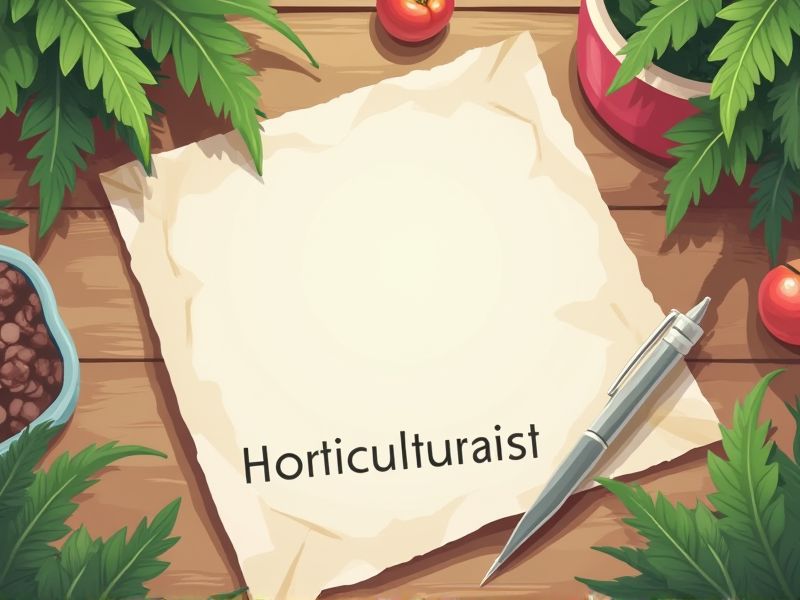
Horticulturists often require specific certifications due to the diverse skill set demanded by their profession, ensuring they meet industry standards and best practices. These certifications validate expertise in areas such as plant health, sustainable practices, and advanced cultivation techniques. Earning relevant credentials can enhance a horticulturist's credibility, opening doors to advanced opportunities and higher responsibilities within the field. Below are some key certifications essential for aspiring horticulturists.
Certified Professional Horticulturist (CPH)
Certified Professional Horticulturist (CPH) ensures a horticulturist possesses comprehensive knowledge in plant identification, disease management, and pest control, critical for maintaining healthy ecosystems. Certification often leads to increased job opportunities as employers prioritize candidates who demonstrate a verified standard of expertise. CPH holders tend to have access to exclusive industry resources and continuing education, fostering ongoing professional development. Certification helps instill confidence in clients and employers, as it signifies a commitment to quality and adherence to industry standards.
Master Gardener Certificate
The Master Gardener Certificate provides horticulturalists with advanced knowledge and up-to-date practices, enhancing their expertise in plant care and landscape management. Earning this certification builds credibility, fostering trust with clients and employers. The program offers a platform for networking with other professionals, leading to potential collaborative opportunities and shared resources. Many horticultural roles or projects specifically require certification as a qualification, making it a valuable asset for career advancement.
Pesticide Applicator Certification
Pesticide Applicator Certification ensures horticulturists are knowledgeable about safe pesticide use, reducing potential harm to humans and the environment. It provides a standardized understanding of pest management practices, essential for maintaining healthy plant systems. Certification also complies with legal requirements, preventing fines and operational shutdowns. Properly certified horticulturists contribute to consumer trust in agricultural products by demonstrating professionalism and commitment to safety.
Certified Crop Adviser (CCA)
Certified Crop Advisers (CCAs) provide critical expertise in pest management and soil health, which directly impacts horticulture productivity. Horticulturalists rely on CCAs for guidance in nutrient management, leading to more effective fertilization strategies and healthier plant growth. The precision recommendations made by CCAs help reduce environmental impact while optimizing yield and quality. CCAs also stay informed on the latest agricultural technologies, ensuring that horticulturists can adopt innovative practices efficiently.
USDA Organic Certification
Horticulturists seeking USDA Organic Certification enhance consumer trust by ensuring their products meet strict federal guidelines. The certification enables access to specialized markets where consumers prioritize organic produce. Certified status can lead to increased profitability due to premium pricing associated with organic goods. It helps in promoting sustainable agricultural practices, reducing the reliance on synthetic fertilizers and pesticides.
Integrated Pest Management (IPM) Certification
Integrated Pest Management (IPM) certification is important for horticulturalists because it provides them with a structured approach to pest control that reduces reliance on chemical pesticides. This certification ensures that horticulturists use environmentally sensitive methods, preserving ecological balance and promoting biodiversity. It helps in enhancing crop yield and quality by effectively managing pests through scientifically-backed techniques. IPM certification can also increase marketability and consumer confidence, as it demonstrates a commitment to sustainable and responsible pest management practices.
Sustainable Horticulture Certification
Adopting sustainable horticulture practices ensures environmental preservation by reducing chemical usage, which directly influences ecosystem health. Horticulturalists with certification can access larger markets, as consumers increasingly prefer products recognized for their sustainable origins. Certification often leads to improved resource management, resulting in cost savings and increased efficiency in crop production. The push for sustainable methods results in heightened compliance with regulations, minimizing legal risks and enhancing the reputation of horticultural businesses.
Landscape Irrigation Certification
Landscape Irrigation Certification ensures horticulturalists gain essential knowledge for efficient water management, which can significantly reduce waste and promote sustainable practices. Certification leads to improved irrigation designs that align with environmental regulations, preventing runoff and protecting local ecosystems. Certified professionals are more likely to enhance plant health by delivering optimal water levels, which boosts growth and reduces disease incidence. As the demand for water-efficient landscapes grows, certified horticulturalists are better equipped to meet industry standards and client expectations.
Greenhouse Management Certification
Greenhouse Management Certification equips horticulturalists with the latest knowledge on climate control technologies, crucial for optimizing plant growth. The certification ensures adherence to industry sustainability standards, reducing carbon footprints and resource consumption. It enhances credibility and marketability, facilitating career advancement and business opportunities. As consumer demand for sustainable and efficiently produced plants increases, certified horticulturalists are better positioned to meet these evolving preferences.
ISA Certified Arborist
An ISA Certified Arborist ensures the health and safety of trees, which directly affects the overall landscape quality and biodiversity in horticultural projects. The certification provides evidence of expertise in tree care, crucial for managing complex ecosystems and enhancing plant health in gardens and parks. Knowledge from an arborist helps horticulturists make informed decisions on tree selection, placement, and care, optimizing growth conditions. Certified arborists also offer risk assessments, preventing potential hazards from tree-related issues in public and residential spaces.
Summary
You can gain new skills and increase your competence by pursuing horticultural certifications. These certifications often lead to enhanced job prospects, as employers value formally recognized expertise. Holding such credentials typically results in higher respect and credibility within the horticultural community. In several cases, certified horticulturists may also unlock opportunities for leadership roles or entrepreneurial ventures.
